In this article, we’ll take a closer look at some of the most popular kitchen countertop materials and explore their pros and cons. By the end, you’ll have a better understanding of which material will best suit your needs and lifestyle. So, whether you’re a master chef or a casual cook, read on to discover the perfect kitchen countertop material for you.
Granite Countertops
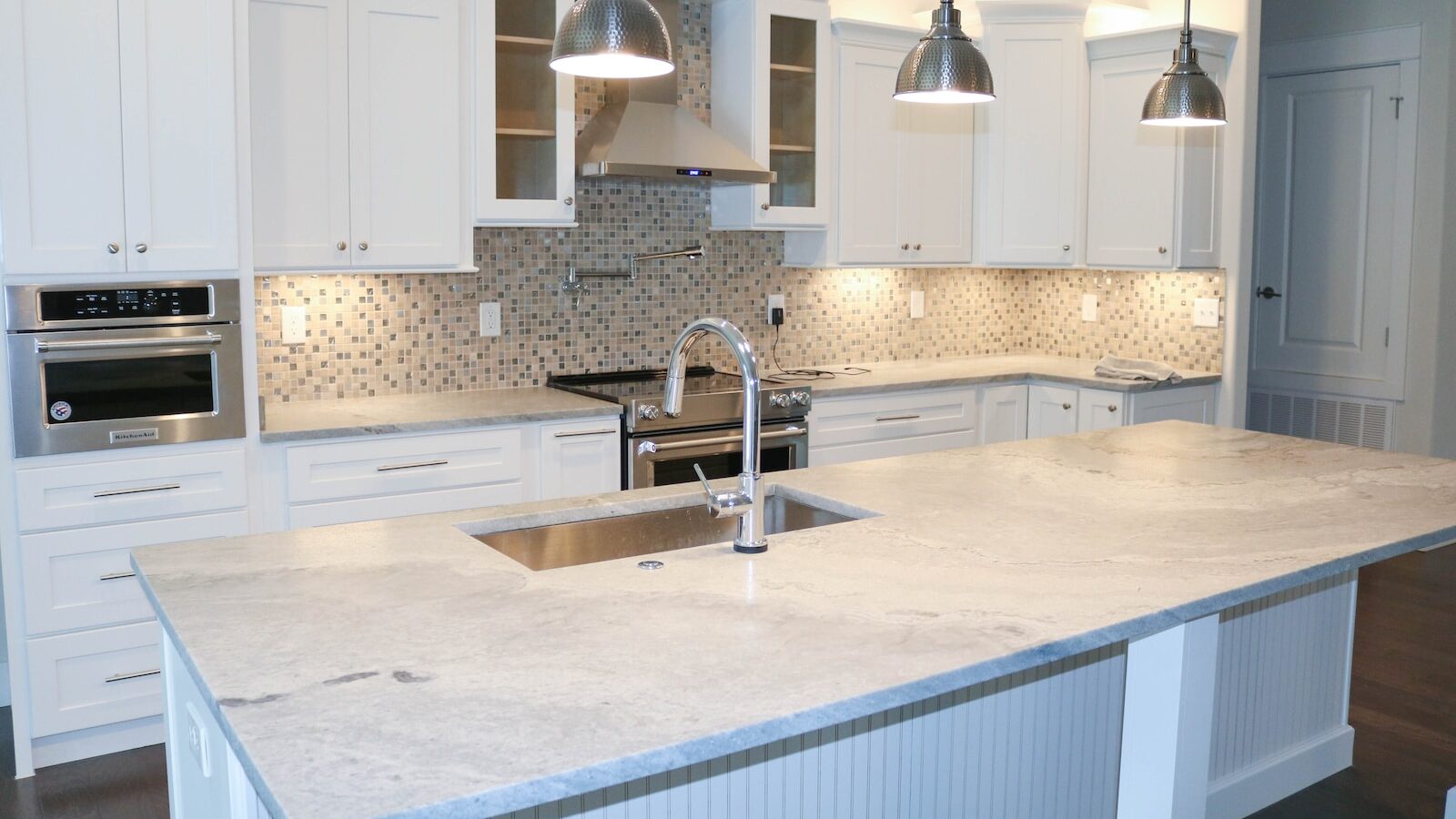
Granite countertops are a popular choice for many homeowners due to their durability and natural beauty. Granite is a natural stone that is incredibly hard and resistant to scratches, heat, and stains. It is also available in a wide range of colors and patterns that can add a touch of elegance to any kitchen. However, there are some downsides to granite as well. For one, it can be quite expensive, with prices ranging from $50 to $200 per square foot. Additionally, granite is a porous material that requires regular sealing to prevent stains and bacteria from seeping in. Finally, granite is a heavy material that requires professional installation, which can add to the overall cost.
Quartz Countertops
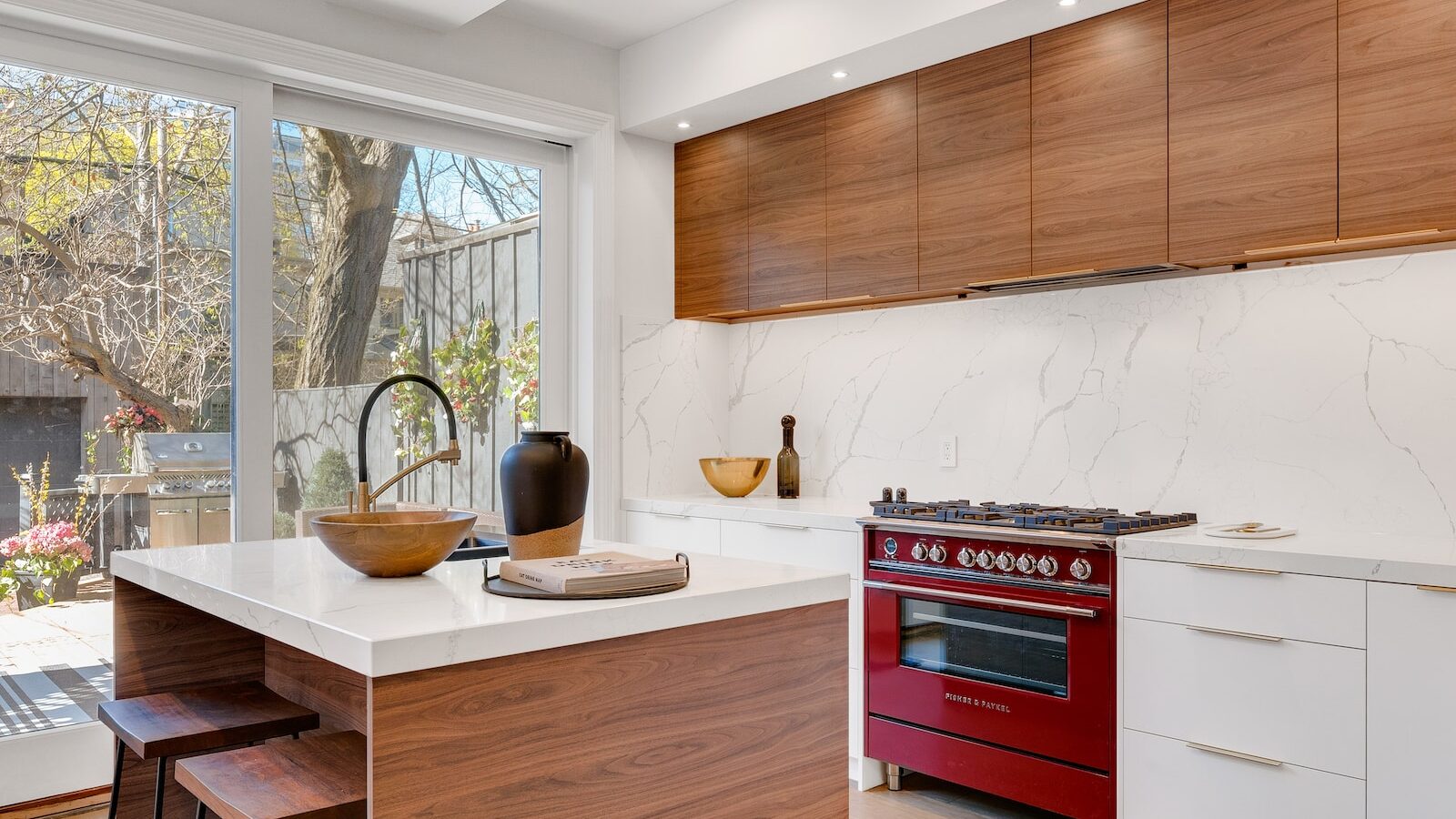
Quartz countertops are another popular option for homeowners who want the look of natural stone without the maintenance. Quartz is a man-made material that is composed of crushed quartz and resin. It is incredibly durable, resistant to scratches, heat, and stains, and requires very little maintenance. Additionally, quartz is available in a wide range of colors and patterns that can mimic the look of granite or marble. However, there are some downsides to quartz as well. For one, it can be quite expensive, with prices ranging from $60 to $150 per square foot. Additionally, quartz is not as heat-resistant as granite, and can be damaged by high temperatures. Finally, quartz can be prone to chipping or cracking, especially on the edges.
Marble Countertops
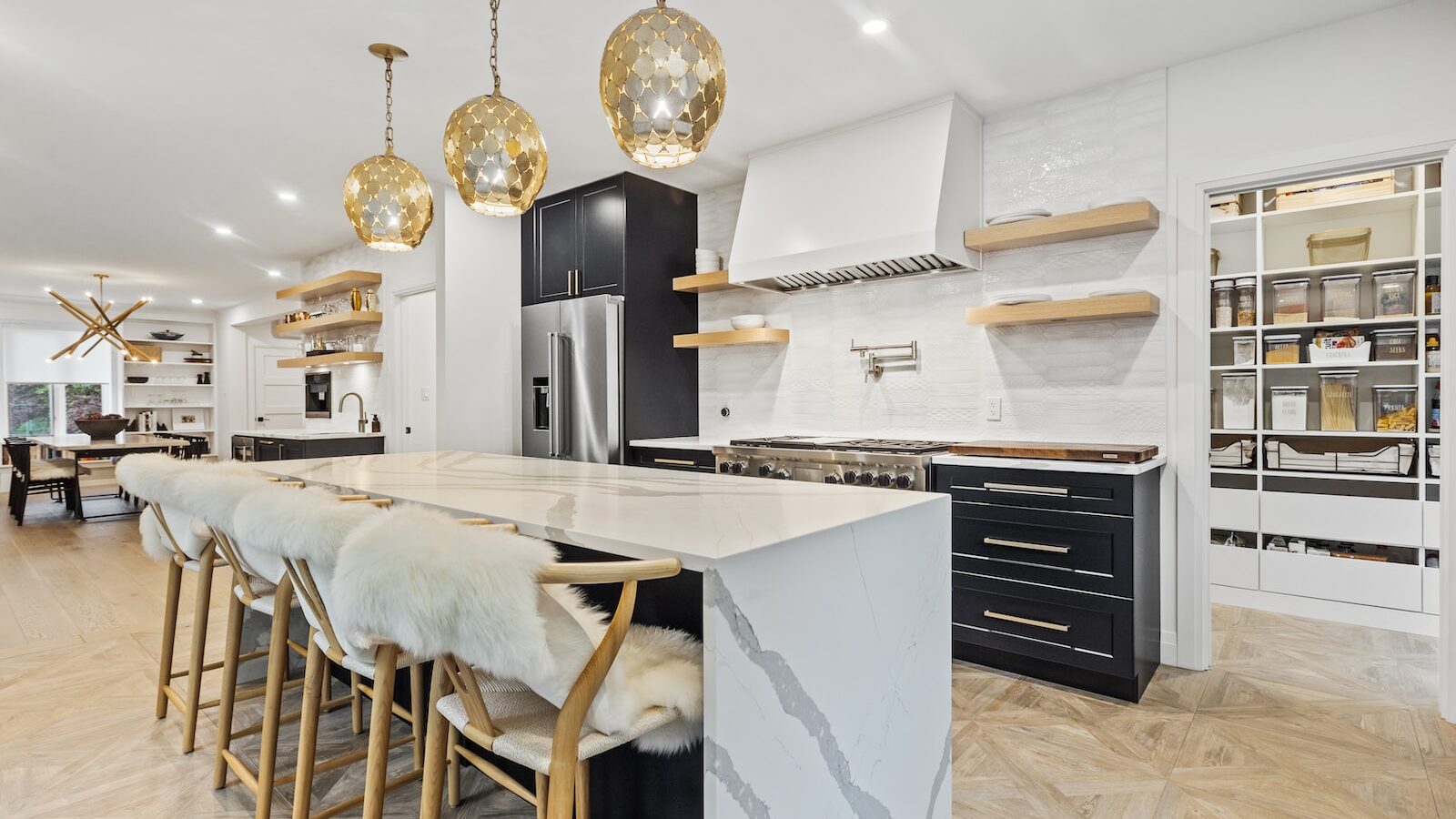
Marble countertops are a classic choice for those who want a luxurious and elegant look in their kitchen. Marble is a natural stone that is prized for its unique veining and patterns. It is also heat-resistant, making it ideal for baking and cooking.
However, there are some downsides to marble, for one, it is a softer stone that is prone to scratches and stains, and, it’s also a porous material that requires regular sealing to prevent damage. It can also be prone to chipping and cracking.
Additionally, marble is one of the most expensive countertop materials, with prices ranging from $100 to $250 per square foot.
Laminate Countertops

Laminate countertops are a popular choice for those who want an affordable and low-maintenance option. Laminate is a synthetic material that is made by layering paper or fabric with resin and coating it with a protective layer. It is available in a wide range of colors and patterns, and can even mimic the look of natural stone. Additionally, laminate is easy to clean and requires very little maintenance.
However, there are some downsides to laminate as well. For one, it is not as durable as natural stone, and can be prone to scratching and chipping.
Additionally, laminate can be damaged by heat, and should not be used as a cutting surface. Finally, whilst cost-effective, some may view laminate countertops as cheap and tacky, and may not add value to your home if that is important to you. Although, some of the new laminates, such as those from WilsonArt are breaking the mould and are well worth a look.
Concrete Countertops

Concrete countertops are a popular choice for those who want a modern and industrial look in their kitchen. Concrete is a durable and heat-resistant material that can be custom-made to fit any kitchen. Additionally, concrete countertops are available in a wide range of colors and patterns and can be polished to a high shine. However, there are some downsides to concrete as well. For one, it is a porous material that requires regular sealing to prevent stains and damage. Additionally, concrete is prone to cracking and chipping, especially on the edges. Finally, concrete countertops can be quite heavy and may require additional structural support.
Stainless Steel Countertops
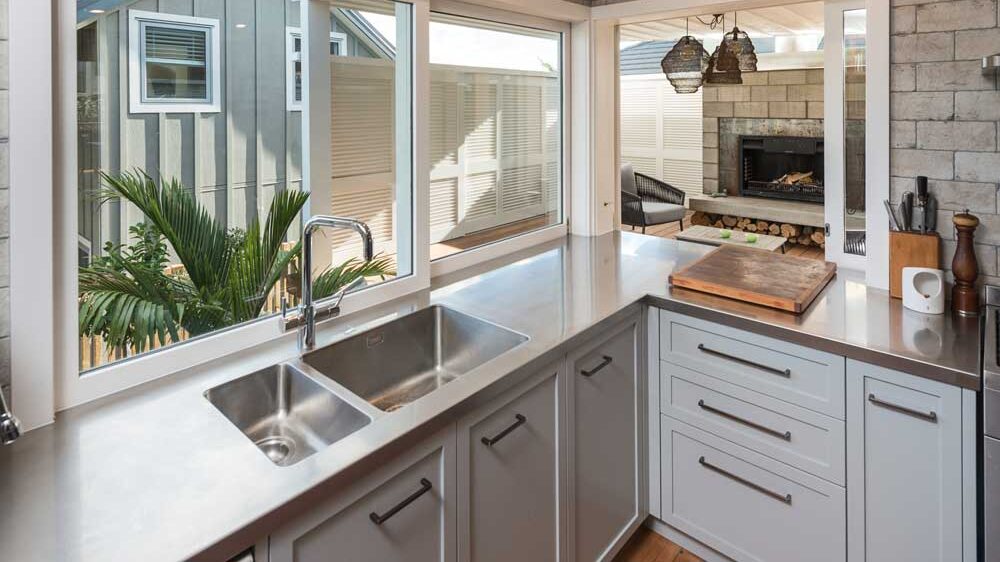
Stainless steel countertops are a popular choice for those who want a sleek and modern look in their kitchen. Stainless steel is a durable and heat-resistant material that is easy to clean and maintain. Additionally, stainless steel countertops are available in a wide range of finishes, from brushed to polished. However, there are some downsides to stainless steel as well. For one, it can be quite expensive, with prices ranging from $75 to $200 per square foot. Additionally, stainless steel is prone to scratching and can be noisy when pots and pans are placed on it.
Finally, stainless steel can look cold and sterile, and may not be suitable for all home kitchen styles but may be the perfect choice for an outdoor kitchen.
Recycled countertops
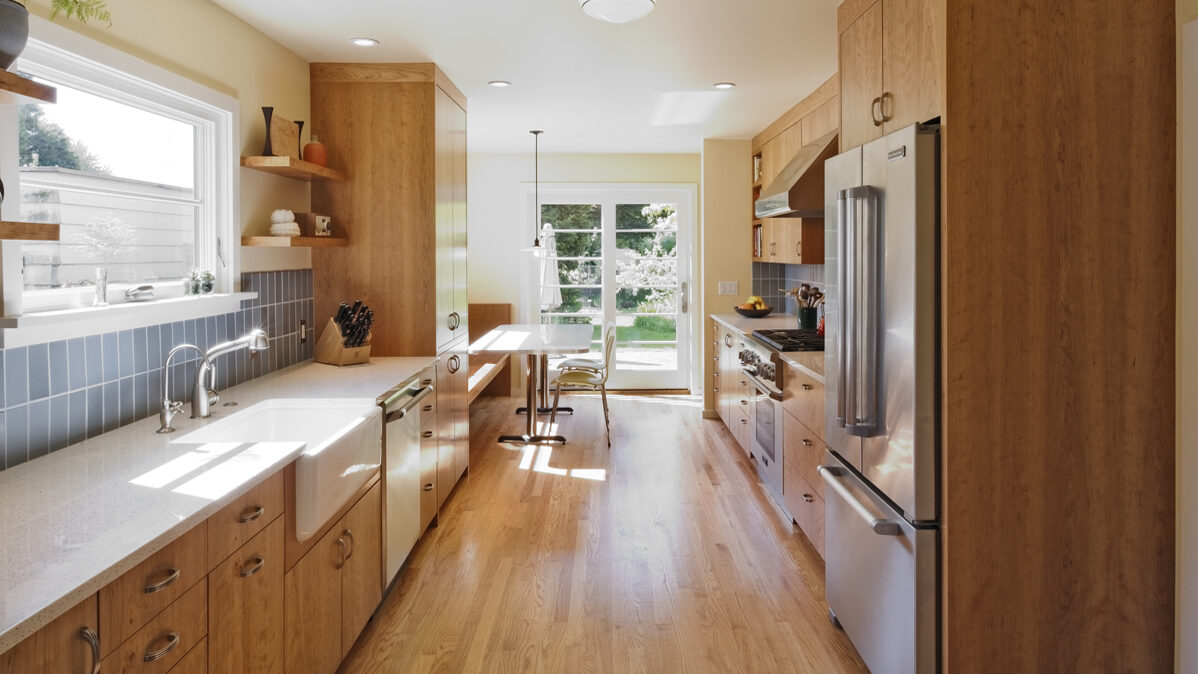
Recycled countertops are a great option for the environmentally-minded home remodeler. They’re durable and stylish, and they’re made out of recycled materials that would otherwise be destined for the landfill.
The main downside to recycled countertops is that they may not fit in with your existing kitchen décor, as well as traditional wood-look countertops might. However, there are plenty of options available to you—from lighter colors like creamy whites and soft grays to bolder colors like reds and blues.
Another upside is their low cost.
Soapstone Countertops

Soapstone countertops are made of natural stone that is heat resistant, non-porous, and durable. They have a unique matte finish that gives them a rustic look and can be easily maintained with regular oiling. However, soapstone is prone to scratches and dents and requires regular upkeep to maintain its appearance. It is also a more expensive option compared to other countertop materials.
Travertine countertops
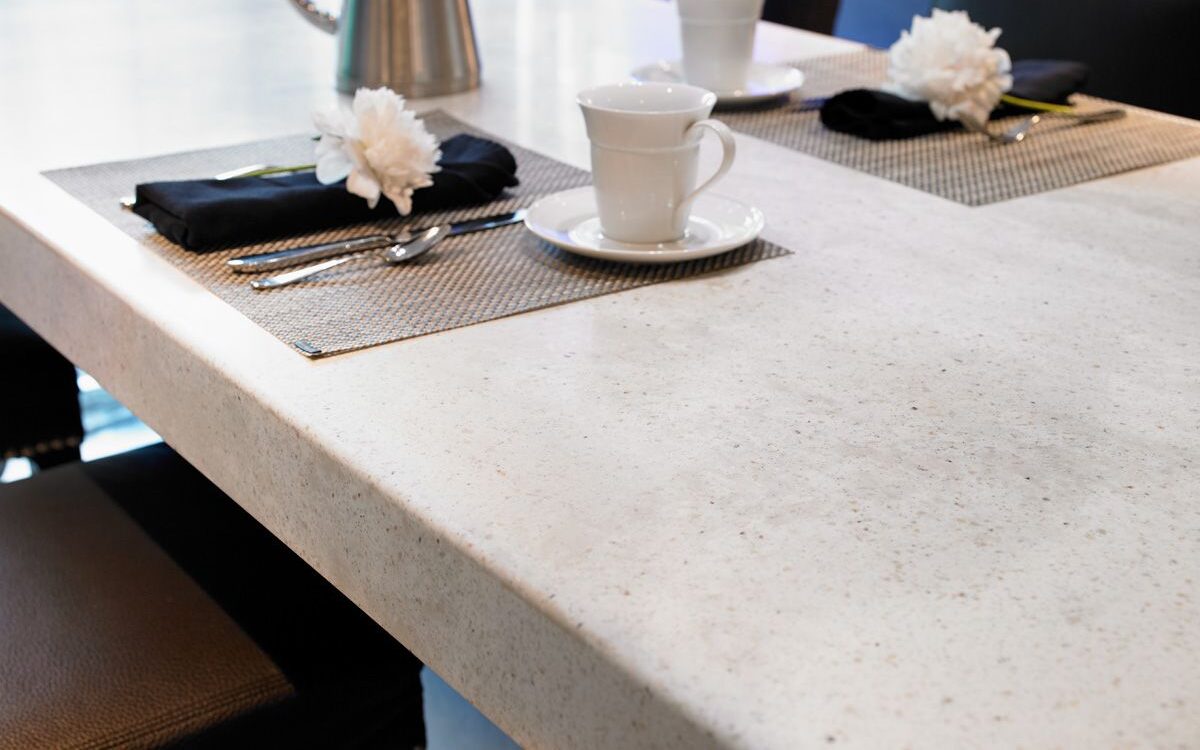
Travertine countertops are made from a natural stone that is available in a variety of colors and patterns. They have a unique, earthy look that can add a touch of elegance to any kitchen or bathroom. Travertine is also durable, heat-resistant, and easy to clean with a damp cloth. However, travertine is a porous stone and requires regular sealing to prevent staining and damage from acidic substances. It is also prone to scratches and dents, which can be difficult to repair.
Travertine is a more expensive option compared to other countertop materials, and the cost can increase depending on the level of customization required.
Despite their drawbacks, travertine countertops can be a stylish and durable addition to any home.
Silestone Countertops

Silestone is a brand of engineered quartz that is made up of natural quartz crystals, resins, and pigments. This combination of materials creates a surface that is not only resistant to scratches and stains but also to heat and impact.
One of the biggest advantages of Silestone countertops is their low maintenance. Unlike natural stones like granite and marble, Silestone does not require sealing or polishing. It is also non-porous, which means that it does not absorb liquids or harbor bacteria, making it a hygienic option for kitchens and bathrooms. Another benefit of Silestone countertops is their wide range of colors and patterns. From classic whites and blacks to bold blues and greens, Silestone offers a variety of options to suit any style and taste.
Wood Countertops
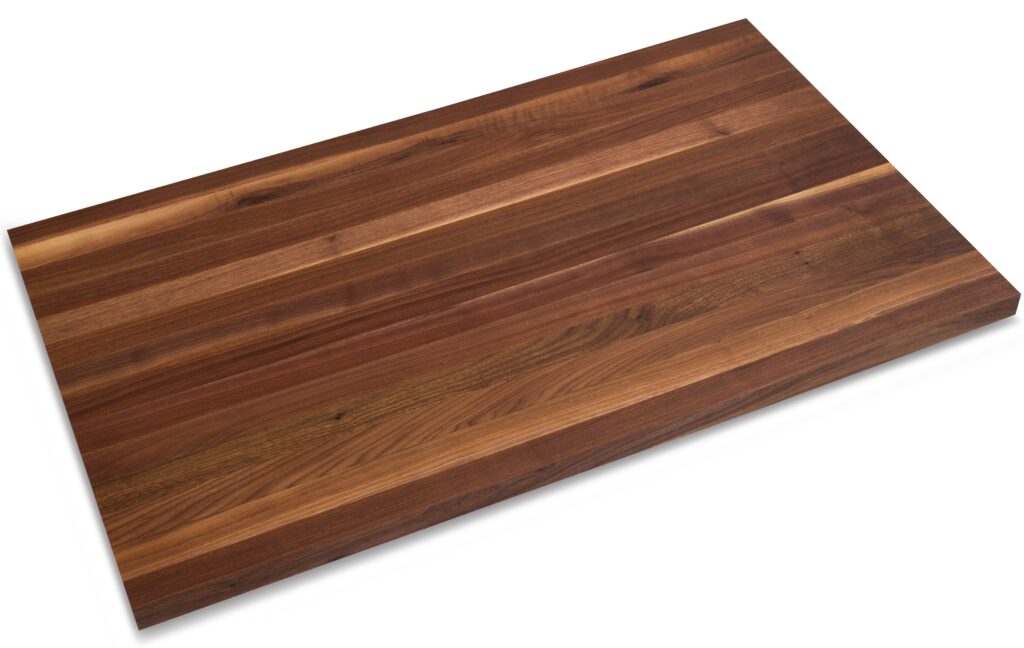
Maple, Walnut and even Bamboo are popular choices for kitchen countertops each with its pros and cons.
Bamboo kitchen countertops are eco-friendly, durable, and easy to maintain. However, they can be more expensive than other materials and may require occasional sealing to prevent water damage.
Maple kitchen countertops are a popular choice due to their durability and natural beauty. However, they require regular maintenance and can be easily scratched or stained if not properly cared for.
Walnut countertops are a luxurious addition to any kitchen or bathroom. With their rich, warm tones and unique grain patterns, they add a touch of elegance and sophistication to your space. Not only are they visually stunning, but they are also extremely durable and long-lasting. Walnut is a hardwood that is known for its strength and resistance to wear and tear. It is also resistant to moisture and staining, making it an ideal choice for kitchen and bathroom countertops where spills and splashes are common. In addition to their durability, walnut countertops are also a sustainable choice. Walnut trees are grown in managed forests, making them an eco-friendly option.
Wood countertops can be customized to fit any design aesthetic, from modern and minimalist to rustic and traditional. They can be finished with a variety of stains and sealants to achieve the desired look and protect against damage.
Overall, wood countertops are a beautiful and practical choice for any home renovation or remodeling project. Their natural beauty, durability, and sustainability make them a smart investment that will enhance the value and functionality of your space for years to come.
Comparing the Cost of Each Material
When it comes to choosing the right kitchen countertop material, cost is often a major factor. While some materials may be more expensive upfront, they may also last longer and require less maintenance in the long run. Granite and marble are some of the most expensive materials, with prices ranging from $100 to $250 per square foot. Quartz and stainless steel are also on the higher end, with prices ranging from $60 to $200 per square foot. Laminate and wood are some of the most affordable options, with prices ranging from $20 to $150 per square foot. Concrete falls somewhere in the middle, with prices ranging from $50 to $150 per square foot.
Choosing the Best Kitchen Countertop Material for Your Needs
When it comes to choosing the best kitchen countertop material for your needs, there are several factors to consider. First and foremost, you should think about your budget and how much you are willing to spend. Additionally, you should consider the style of your kitchen and how each material will fit in with the overall design. Finally, you should think about how much maintenance and upkeep each material will require, and how well it will hold up to daily use. By considering these factors, you can make an informed decision and choose the best kitchen countertop material for your needs.
Conclusion
Choosing the right kitchen countertop material can make all the difference in the look and functionality of your kitchen. Whether you prioritize durability, aesthetics, or cost, there is a material out there that will meet your needs and preferences. From granite to quartz to wood, each material has its own unique pros and cons that should be carefully considered before making a decision. By taking the time to research and compare different materials, you can ensure that you choose the perfect kitchen countertop material for your home.

